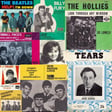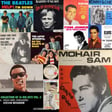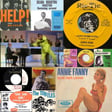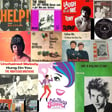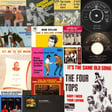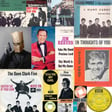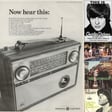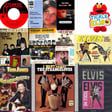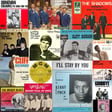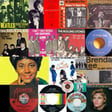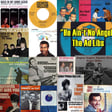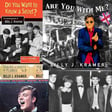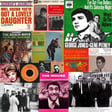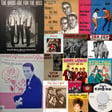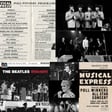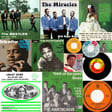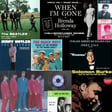Become a Creator today!Start creating today - Share your story with the world!
Start for free
00:00:00
00:00:01

Tribute to Brian Wilson and Sly Stone
RIP Sylvester Stewart, March 15, 1943 - June 9, 2025
RIP Brian Wilson, June 20, 1942 - June 11, 2025
Martin Quibell, Kit O'Toole and I "break period" to celebrate the lives and music of two artists whose influence cannot be measured, and have been omnipresent as performers, songwriters and producers from the "Toppermost Era" to the present day. #DancetotheMusic #AFriendLikeYou #madeonzencastr Support this podcast at the $6/month level on patreon to get extra content! Create your podcast today! #madeonzencastr . If you are looking for Beatles summer fun, join our friends at the Magical Mystery Camp!
Recommended
Transcript
Introduction and Sponsorship
00:00:02
Speaker
All right, before we get started, a quick reminder that we are being sponsored this first half of the year by the Magical Mystery Camp. If you haven't registered, the camp is occurring from June 24th to the 27th, 2025 at the Full Moon Resort in Big Indy in New York.
00:00:22
Speaker
You can register at www.magicalmysterycamp.com slash paupermost. It's well worth your
Reflecting on Tough Times and Losses
00:00:30
Speaker
time. I say, where are we going, fellas? And they go, to the top, Johnny.
00:00:34
Speaker
And I say, where's that, fellas? And they say, to the toppermost of the poppermost. And right. And we'd all sort cheer up. Where are we going, Johnny? Straight to the top, boys.
00:00:45
Speaker
Oh, yeah? Where's that? The toppermost of the poppermost. Oh, kind of a tough week here in toppermost land. Ed Chen. And I'm Martin Quibel.
00:00:56
Speaker
Kid O'Toole will be joining us... on our way out, but she's not able to join our little semi-live conversation here. It's a tough week because, well, we've lost two of the giants from toppermost land, one who's a giant right now and one who is just starting his journey.
00:01:15
Speaker
Absolutely. Two legends in music. And two shared a lot of demons. Indeed. Yes.
Sly Stone's Legacy and Influence
00:01:23
Speaker
So we will start with Sly of Sly and the Family Stone.
00:01:27
Speaker
One of the greats, Sly Stone, born Sylvester Stewart, passed away today at the age of 82, born in Denton, Texas, March 15th, 1943, had been living in Los Angeles, California, passed away on June 9th, 2025.
00:01:47
Speaker
Tonight tributes are pouring in for a funk music legend and pioneer. Sly Stone died today at 82. The Texas native, he was widely known as the front man for the popular group Sly and the Family Stone.
00:01:59
Speaker
And according to family, Sly had been dealing with COPD, chronic lung condition, and other underlying health issues. We're told he passed away peacefully, surrounded by his three children, closest friend, and extended family.
00:02:11
Speaker
We have yet to actually see Sly and the Family Stone on the charts, but we have seen his work. We have. We've seen his great production work. Laugh Laugh by the Bo Brummels. And in our July show, the next single by the Bo Brummels, which was also produced by Sly Stone, is coming on.
00:02:28
Speaker
Not to dwell on it too much, but I think we've already said that his production work, we can see how he will become the Sly Stone that we all know and love.
00:02:39
Speaker
And then the other thing is Sly was completely colorblind. You know here he was producing what is effectively British Invasion style pop. He was a radio DJ at the time in San Francisco for a soul station.
00:02:54
Speaker
And he did not hesitate to play the Beatles and the Stones on his radio show. no I never knew that he was colorblind, especially with those outfits that they would famously wear. Not that kind of colorblind, Marv.
00:03:06
Speaker
Oh, okay. Of course. Marv has to get a little funny in there, even in these somewhat somber times. Being serious with that subject, I was talking with a friend of mine, Kathy Moran, and I was saying to her that I always saw Sly Stone, Sly and the Family Stone, the big influence on me as a bass player and musician.
00:03:30
Speaker
I sort of like linked them to the to the British group, The Equals, as well. with this, which is for the time, they were very interesting band because they were made up of different races working together as a whole, as a unit to create this incredible sound that did away with all of that. And it was just about being united. It was almost their belief that in showing that they believed that the world could be as one together and we didn't have to have these divisions and in that band Sly and the Family Stone it was a perfect representation of that.
00:04:09
Speaker
Which is a little bit ironic because the first hit from Sly and the Family Stone, they were a little bit reluctant to do the pop thing. They wanted to be a hardcore soul outfit, which they would certainly become, but their first single is a very poppy single.
00:04:26
Speaker
Yeah, but it's also one of their absolute great songs. You think about Sly and the Family Stone and Dance to the Music is right up there among the songs that you think of.
Discussion on Sly Stone's Iconic Songs
00:04:37
Speaker
So we will be seeing Dance to the Music, oh, well, we're in 1965, so we're about three years away from Dance to the Music. We are, because i don't think anything hit from their 1967 album or didn't chart, did it That was fairly unsuccessful from a singles standpoint, but again, they weren't really looking to make a big splash on the singles chart or the Billboard Hot 100 at that time.
00:05:03
Speaker
No, they were not. The Whole New Thing album from 1967 is, it's very different than everything else that's going on. um To a certain extent, it's a sole reflection of what was going on with the Beatles and Pepper.
00:05:17
Speaker
Yeah, that's a good description, yeah. And it was kind of at that point that they said, well, maybe we want to think about actually trying to be a little bit more popular and kind of make some money in this music business.
00:05:29
Speaker
Boy, did they ever. Because so these songs we're going to mention are huge in the world of soul music. fun
00:05:47
Speaker
There's some bottom so that the dancers just won't hide.
00:06:14
Speaker
So, as mentioned, the first single we want to talk about from Sly and the Family Stone is Dance to the Music, which is a great single. It has just enough of the R&B. It is not quite the James Brown thing, but there's just enough touches of that feel to the single.
00:06:33
Speaker
But it is still very definitely a pop single. It's a pop single, but you've got elements there as well of... gospel as you said you know soul or r&b and there's all of that there from the initial scream at the beginning for instance by rosie and then
00:07:06
Speaker
That great lead vocal by Freddie Stone as well and everything in there. It's like a smorgasbord of different styles just thrown together and put out there that really works.
00:07:18
Speaker
all right, the second single we want to talk about was also from 1968, and this would be their first number one hit, Everyday People, which kind of reminds me of the things that Stevie Wonder would be doing in the immediate coming years, and it has a little bit of a touch of the wide album to it, to my mind. It's it's almost a little bit folk-influenced.
00:07:55
Speaker
It's an interesting one. also makes me think of what we would get eventually with something like with Funkadelic when we get One Nation Under a Groove. It's got that sort of almost acoustic funk feel to it.
00:08:08
Speaker
And it's a perfect song for 1968 when, again, going back to the racial equality thing, they were presenting it, but they were presenting it in an almost Lenin-esque utopian vision of everyday people.
00:08:22
Speaker
Well, the song perfectly describes where the group were coming from as well. All the races together as a unity. The song is saying, I'm everyday people. They're saying that they are all people. There are none of the, there's no black, there's no white, there's no this, that and the other.
00:08:40
Speaker
We're just people. And that song perfectly puts over that feeling that they're trying to put across as well. I am he is you are he is you are me and we are all together. Exactly. Yeah. The third single will that we want to talk about from the next year is probably their best known single.
00:09:00
Speaker
Thank you for letting me for let me be myself again. going to love that wordplay. It's also very Lenin-esque wordplay. That is
00:09:30
Speaker
You could see where Prince would be inspired with the way that he would write and title songs through that as well. That sort of style as well. They are moving ever so slightly away from the pop thing, but it's still a pop record to my ears.
00:09:46
Speaker
It is to mine as well.
00:10:06
Speaker
Like me, Ed, when you were took up bass, was this one of those bass lines that you had to learn yourself as well? For sure. I still can't play it, to be honest with you.
00:10:17
Speaker
Wow. I play it every time I pick up a bass. I can sort of fake my way around it, but that's about as far as I can get. It's not that hard a bass line, but it's not an easy bass line.
00:10:28
Speaker
No, it is not. And it's it's all about the groove as well. The next single is also from 1969, and that's I Want to Take You Higher. love this. He's got mouth organ in this and everything. That sly on the mouth organ on here as well, and it's just like he's got on Dance to the Music. He's doing the mouth organ thing here. It's just great. All, you know, yeah.
00:10:51
Speaker
It's a song that they would play at Woodstock and would play on Soul Train. Yeah. But it fits everywhere, doesn't it? It's got that sing-along ability that Dance to the Music had, plus the positivity.
00:11:12
Speaker
For sure, although this is actually less of a message song. Yeah, agreed. It's about just wanting to give you that sort of party and that bit of a boost to just make you happy and full of joy.
00:11:26
Speaker
And we should mention that Billy Preston was part of this song because Sly actually wrote the predecessor in a song called Advice, which shows up on Billy's wildest organ in town.
00:11:58
Speaker
I want to take you higher. Go and listen to the main show. We have already told you about the friendship and then subsequent disillusionment of that friendship between Billy and Sly.
00:12:11
Speaker
Yeah. You go and listen that song. It's very definitely a predecessor of Want to Take You Higher. Absolutely. Absolutely. And then what I would call the second biggest song from Sly, and that is from two years later, that's Family Affair.
00:12:26
Speaker
Family Affair. From what many people would say is Sly and the Family Stone's best album, there's a riot going on. Blood's thicker than the mud, it's a family affair.
00:12:39
Speaker
It's family affair. family affair. family affair. Of the fair.
Remembering Brian Wilson of the Beach Boys
00:13:09
Speaker
This song will be ranked as number 57 on Rolling Stone's 500 best songs of all time. Yeah. Another song that's just beautiful with its message and talking about just that wonderful dream he had of of everybody being together as one and and not not having any of these divisions between people. It's just beautiful.
00:13:33
Speaker
Now, despite what we just said about Billy Preston, Billy Preston actually shows up on this song on the Holner Pianet. Wonderful. And frequently mentioned Bobby Womack shows up on rhythm guitar.
00:13:45
Speaker
Yes. That is our five. Is there anything else you want to actually mention? Sly had ah had a good, big, long career. I mean, he continued producing and working through basically the end of his life. I mean, recently he's he's been experimenting musically with people, which was great to see. I've listened to some of his more recent material and there's some really great stuff in there.
00:14:09
Speaker
He doesn't seem to have lost his love for experimenting with music and with but just seeing what he could do with the whole feel and the the enjoyment that he had with it.
00:14:21
Speaker
And he would continue to try and say something with his music. yeah We don't want to go too much into it, but there was also a period in there oh between the mid-70s and the mid-90s when, as we mentioned earlier, his demons caught up with him. And ah he was, I won't quite say drug-addled. He gave in to the substance abuse.
00:14:44
Speaker
He did. But the good thing is that he got past that. And it's nice that over recent years, things have been much more positive for him. Sly passed on June the 9th, 2025.
00:14:55
Speaker
The family said that he died of chronic obstructive pulmonary disease in addition to other underlying health issues. The other thing that we should mention about Sly is there's a great documentary, Sly Lives, which came out earlier this year.
00:15:11
Speaker
And if you haven't seen that, you should go ahead and look for it. It's a great version of Sly's life. and That is honest as well. That's good to know. I mean, And Sly was contributing to a screenplay based off of his memoir, which we did mention, you know, thank you for letting me be myself.
00:15:34
Speaker
The screenplay is completed and hopefully, well, I mean, you know, especially now that he's no longer with us, someone one will proceed with making that happen. I think he deserves a good biopic, personally.
00:15:48
Speaker
A weird connection between Sly and our other artist who passed. Sly and Terry Melcher were good friends.
00:15:58
Speaker
Wow. Sly was in Hollywood and in and around the house when the Tate LaBianca murders occurred.
00:16:09
Speaker
Ooh, wow, wow. So through Terry Melcher, we come to Brian Wilson. I mean, what can we say about Brian Wilson? He wrote what I think is the greatest song of all time with God Only Knows. Not just you, not counting any of his own songs.
00:16:26
Speaker
Paul McCartney would probably agree with you. We know that that's his favorite non-Beatles McCartney song. we We also know that it was George Martin's favorite, well, as he called it, pop song as well.
00:16:38
Speaker
Have you ever seen the charity gig where Paul and Brian were on stage together doing God Only Knows It? That's worth a look if you haven't. I've never seen that, now The video's not available. The audio is available.
00:16:51
Speaker
Okay. I need to check that out. It's a blue beam.
00:17:00
Speaker
I just didn't know what to be me. The world just showed nothing to me. So what good would it make you do me?
00:17:11
Speaker
God only knows what I feel.
00:17:30
Speaker
Don't they know what I feel without you?
00:17:46
Speaker
Brian passed what for us is today on June the 11th, 2025 at age 82. We knew this was coming. but We did. he's not been very well lately with the dementia and other things that he's had to put up with lately.
00:18:02
Speaker
Exactly. Since May of last year, he's been under a court conservatorship. Right. And... Well, there's not much else to say. We should mention that both Sly and Brian Wilson are obviously in the Rock and Roll Hall of Fame.
00:18:19
Speaker
For sure. But yes, Brian and the Beach Boys, they came up just about the same time as the British Invasion, just before the Beatles would hit. Yeah, it was nice because there was always, Paul and the other Beatles have mentioned this, there was always not a one-upmanship or rivalry as such between, but there was like this nice almost competition thing where one of them would create something and then the others would be, well, we've got a one-up on that. So you get the famous, they made pet sounds.
00:18:50
Speaker
So we made, no, so they the Beatles did Revolver. It was Rubber Soul, which led to Pet Sounds, which led to Revolver, which led to Good Vibrations, which was a single not on the album, which then led to Pepper.
00:19:03
Speaker
That's the order it goes in. yeah And i mean even before that, if you haven't been listening, go back and basically every month in the U.S. charts, there's something linking the Beatles and the Beach Boys together through all of this.
00:19:18
Speaker
For anybody interested in that story, Apples and Oranges is a great podcast where they go through that and they discuss the connections, the music of the Beatles and the Beach Boys, and they do the links together. And it does a really good job of of piecing all that together. And the Beatles never made any bones about the fact that they were big Brian Wilson fans.
00:19:41
Speaker
mean, Paul would actually show it. Recently, i heard a story which came out of Bernie Taupin's autobiography. Okay. Bernie and John had gone to a party, and this was when Brian was in pretty bad shape.
00:19:56
Speaker
One of the first times Brian was in pretty bad shape, but Brian was also at this party. Frank Zephyr could direct the Philharmonic Orchestra because he knew more about music than anybody on rock and roll.
00:20:08
Speaker
Brian Wilson. And we're sitting it after the Grammys one night, and it's Iggy, myself, John, tos everybody sitting there. And I hear
00:20:20
Speaker
and i look around and it's brian wilson april go releases introduce me to john lenon
00:20:30
Speaker
and when I know what these guys I've met before. I mean, you know, they've talked about, the Beatles talked about that he wouldn't have done Sgt. Pepper had they not heard pet sounds. So I went, okay. John, this is Brian Wilson.
00:20:44
Speaker
And John looks at me and he goes, oh, hello, Brian. How are you? Good to see you. He says, you know, I've been a big fan all your life. Oh, thank you. He leaves. um Half an hour or later, Psst, Bernie. And Bernie Toppin was sitting there.
00:20:59
Speaker
He introduce me to John
00:21:04
Speaker
Lennon. Bernie looks at me, I you know, he says, John, he says, this is Bernie, this is ah Brian Wilson. And John goes, oh, hello, Brian.
00:21:16
Speaker
And then it happens a third time. John turned to Bernie and said, well, you know, Brian, he's just not well. wow And so they they they then left the party so it wouldn't happen a fourth time. Right.
00:21:29
Speaker
It was obvious that Brian very definitely wanted to talk to John Lennon. Wow. What John would say later is that, oh, no, he just wanted to talk about Across the Universe. Why that song, I don't know. But ah there you have it. don't know either, no. I thought Brian might have asked him about Strawberry Fields Forever or something.
00:21:47
Speaker
Again, Brian wasn't well at that point. No. And thankfully, Brian would also recover at least enough to do some interesting things in the 80s. He appears on Art of McCartney. there He does a really great version of Wanderlust there.
00:22:03
Speaker
He does. Lovely version of that.
Brian Wilson's Musical Impact and Stories
00:22:05
Speaker
And then Paul would duet with him on one of Brian Wilson's albums. Yeah, on the song a Friend Like You.
00:22:13
Speaker
Paul would never hesitate to mention Brian on any occasion where it was appropriate. So, all right. Now, most of these we've actually already covered, except for the big one. We do have five songs and these all pretty much come from the prime era of the Beach Boys.
00:22:31
Speaker
Yes. We're going to start with Surf City by Jan and Dean, which is not a Beach Boys record, but Brian's fingerprints are all over it. Yep. Two girls for every, two girls for every.
00:22:54
Speaker
You've got the rock and roll in there that's been surfed up, you know, if I can use that phrase. And then the superb vocals that unmistakably, you know, Jan and Dean with a bit of Beach Boys-esque in there as well.
00:23:09
Speaker
Of course, we've talked about Brian and his love for the four freshmen and how the Beach Boys sound was so heavily influenced by them, but they did it so well. Yeah, they did. This was a number one hit as well.
00:23:22
Speaker
And we did talk about Surf City way back when in 1963. We've been covering the charts on both sides of the pond since October of 1962. So healthy the second song we want to mention from Brian and the Beach Boys is Surfing USA, which would reach number three in 1963.
00:23:43
Speaker
This is a little bit too much Chuck Berry. Brian is allowed to steal it, I think. Yeah, even Chuck Berry's been on record as saying he doesn't mind. He thinks that they did a really good job with this, which is interesting considering, you know, that Chuck would sue John Lennon.
00:23:57
Speaker
Well, was it Chuck who sued John Lennon or was it Morris Levy? I think it was Morris Levy. Chuck has alternatively been happy about it and been unhappy about it.
00:24:07
Speaker
I think it he's probably fine since he has started getting his writing credit on the song. Yeah. And while it's not an exact copy, it is pretty much Sweet Little Sixteen.
00:24:18
Speaker
Absolutely. Ooh, and hey, he's at war. Inside, outside. Pacific fallacy. Inside, outside. But they do so well with it though.
00:24:30
Speaker
They do a really good job with it to surf it up.
00:24:46
Speaker
they do so well with it though they do a really good job with it to surf it up And then the harmonies. One of the songs we're not going to mention because, well, we're going to mention it in the July charts is California Girls.
00:24:58
Speaker
This is very much lyrically the predecessor of California Girls. Yes. Yeah, I guess Brian was thinking, okay, we got to do one that's all our own. Yeah, definitely.
00:25:09
Speaker
All right, the third song we want to mention, which is one of our favorites, and we did speak of it last year, is I Get Around. Yes. The singing, the harmony is great on I Get Around.
00:25:22
Speaker
I think I mentioned when we spoke about this, that this is an instance where you see how they have these different vocal motifs going. So you get one couple Beach Boys singing this bit, you get another couple of Beach Boys singing a counter to that.
00:25:39
Speaker
And then you get the main vocal in front and you've got all these different vocal bits going on that are like musical instruments in their own rights, along with all the great, you know, women wrecking crew musicians doing what they do as well.
00:25:53
Speaker
And you can see the influence of the Beatles starting to play into what the Beach Boys and what Brian is doing here. Yeah, musically, surely. Musically, yes, absolutely. I gotta find a new place where the kids are hip.
00:26:30
Speaker
Next up is a song that we have just covered, which would be a big turning point for the Beach Boys, and that's Help Me Rhonda. Yeah, we've got it. A big turning point because, well, go and listen to one of our recent episodes where we go into the story of how this song would be the one which would cause Brian to more or less break it off with Murray Wilson completely. If you go online, you can actually find dialogue from around, from the recording session that was recorded and Murray was quite nasty.
00:27:04
Speaker
We do excerpt that in the show, by the way. Yes. The key line there is a slightly or maybe not so slightly inebriated Murray saying, you know, I'm a genius too, Brian.
00:27:14
Speaker
Yeah. But separate from the role of this song in the history of Brian Wilson and the Beach Boys, it's a marvelous song. you know Once they finally get it down, it's another one where the harmonies just work.
00:27:29
Speaker
Yeah. Now the Beach Boys are the Beach Boys as history sort of remembers them. You've got all of these things in place now perfectly in there. This is also the record where Brian had quit the road with the Beach Boys.
00:27:44
Speaker
Yeah. He had all of his time to go into the studio and work on the records. Yeah. Brian's replacement for the live Beach Boys was actually on the session as well, wasn't he? yeah Glenn Campbell.
00:27:57
Speaker
They had a couple, but Glenn Campbell was certainly the main substitute Beach Boy.
00:28:27
Speaker
We all love Help Me Rhonda, but it's maybe slightly underrated, which is a weird thing to say because it is such a big record. It's a number one hit, but but then again, the Beach Boys have had so many number one hits and there's so many standout songs by the Beach Boys.
00:28:44
Speaker
i think I think you're right. I think people in the main might not pick this as like one of the top five because there's so many great songs for people to pick, which is quite strange, really, for a number one hit.
00:28:55
Speaker
Well, I again, as I'm saying, with California girls on the other side of it. Yeah. That one and the final one that we're going talking about are the two that I would say people remember from the Beach Boys era.
00:29:07
Speaker
Yeah, definitely. And so we were talking about that competition between the Beatles and the Beach Boys. Now, the Beatles had already recorded Help when Help Me Ronda came out, but it's entirely possible that Help Me Ronda has at least a bit of influence on what they would then be recording for Rubber Soul.
00:29:29
Speaker
Yeah, I can definitely hear inspiration from around that time with the Beatles where the Armony's on paperback writer, very, very, very, I think, inspired by the Beach Boys for sure.
00:29:44
Speaker
And I can hear a link between Help Me Rhonda and Drive My Car, for example. Yeah, so can I. And so it is Rubber Soul, and it is particularly the American Rubber Soul, we must not forget that, that would influence Brian Wilson to go on and create Pet Sounds, which, well, i mean, Pet Sounds is one of those classic 60s albums.
00:30:07
Speaker
It is. Is it your favorite Beach Boys album, Ed? Yeah. Yeah, I think so. You do. i think it's probably mine as well. It's so complex. pla There's so much going on there.
00:30:21
Speaker
And while I won't quite put it in the category of Pepper, it comes close. It does. It's maybe a step below Revolver, in my mind.
00:30:34
Speaker
Okay, yeah, yeah. So, I mean, let'd say have Pepper and Revolver I put about the same level and then I put Pet Sounds as just ever so slightly beneath those two. So the last single we want to talk about is Good Vibrations, which is, well, that is Brian Wilson's masterpiece.
00:30:52
Speaker
As a production, yes. Yeah. Well, as a song as well. Yeah. As a song as well. Yeah. I really have very little else to say about that. I mean, unfortunately, Good Vibrations has been denigrated a little bit because, well, ah folks who own the Beach Boys have allowed it to be overused in the soda commercial and all the rest that. It's like, oh, that's not good.
00:31:17
Speaker
no But in isolation, the track by itself, that would be the highlight of the Beach Boys era. Yeah, agreed.
00:31:44
Speaker
Gotta keep those love and good Vibrations are happening
00:32:03
Speaker
All right. Other things about Brian. I mean, you always say that Brian Wilson did the wall sound better than Phil Spector does, and he doesn't get enough credit for moving the sound of the wall of sound forward.
00:32:17
Speaker
I very often think that a lot of people understandably think of Brian as an incredible songwriter. and visionary but I ah do think that some people overlook how incredible he was as a producer like you said I've always thought that Brian did a much better job of that wall of sound production style than Phil Spector did I think he took what Phil Spector and those people, you know, Jack Neesha and all these other people had been working with and took it to that high level and gave it more of a clarity than Phil Spector and those people did.
00:32:54
Speaker
And he did all of that with just one ear. Yes. yeah we We must remember that he is deaf in one of his ears. Yeah? Wow. That's a great clip when he and George Martin get together and they actually go through and from the stems, George Martin does a remix and and Brian congratulates George Martin on doing a better mix than he's ever done on the song.
00:33:16
Speaker
I may not always love you As long as there are stars above you God only knows there's always been one of my favorite Beach Boys songs.
00:33:30
Speaker
I'll make you so sure about it And God only knows what I'd be without you
00:33:41
Speaker
I wanted to strip it down and look at its components. This is always the best way to hear the raw material of the melody. So got out the original master tapes. I may not always love you so we got out the original master tape
00:34:00
Speaker
But long as there are stars above you... Which was overdubbed, wasn't it? Yes. So let's take away the backing. Let's call it off. We've got two tracks.
00:34:12
Speaker
One track. God only knows what I'd be without you. The other track. Together. What Brian had done was to write a beautiful song full of unusual changes and then devise a tapestry of sounds to enhance it.
00:34:32
Speaker
For me it was fascinating, being a musical detective, looking at the song structure, back in the sort of studio in which I'd spent most of my working life. We've got the backing voices here.
00:34:44
Speaker
Better?
00:35:00
Speaker
Boy. But you see, this is what amazes me. you but You must have had a kind of blueprint in your mind before you went in the studio, what you were what you were going to think of. Arrangement-wise, but not sound-wise.
00:35:11
Speaker
Right. I couldn't think in my head before I got to see what it would sound like until I got there. No, sure. That would come with the studio work. But you must have had the plan there of all the harmonies. Yeah, absolutely.
00:35:22
Speaker
It's a lovely song and a beautiful record.
00:35:28
Speaker
You know what?
00:35:36
Speaker
That's a better mix than I had for the master. You're making a better mix of this than I did in the master. Never. You did it. I don't know, it's something about the way you put the balance that makes better music than that.
00:35:51
Speaker
George, I can't believe this is happening. Do you think that it was Pepper that really broke him? I like Smile. I like the smile that Brian would do as a solo artist. And actually went and saw that tour.
00:36:07
Speaker
But I also don't think that that would have been the genius record that history has kind of led us to believe it might have been. um Yeah, I'll agree with with you on that.
00:36:19
Speaker
It's possible that just the whole trying to push things and go this bit further and all, I've got to better what I did before, what I did before, and the whole stress of that, I think that didn't help matters.
00:36:31
Speaker
But he also undoubtedly had some demons there that were giving him problems that I think came to a head at that point.
00:36:45
Speaker
in time. And he very definitely had mental illness in the history that we spoke of with his father. He was one that was a damaged child. yeah yeah That damage basically continued with him through his entire life.
00:37:01
Speaker
Yeah. I also think that it helped him as a creative force as well. I think it's awful to say, but sometimes people who have these demons, who have these problems in their lives, sometimes they help with their creativity and it's an awful thing to probably say.
00:37:19
Speaker
But I do think that that's true. All we need to do is look at John Lennon. Yeah. I'm not going to go so far as John in the Rolling Stone interview and say that genius is pain, but genius is certainly a reflection of pain.
00:37:33
Speaker
Absolutely. you You wouldn't have a song like Julia if it wasn't for those demons that John had in his life. So as far as things that you should see with regards to Brian and and Brian's story, if you've never seen Love and Mercy, that is a great biopic. you know, we were talking about the potential sly biopic.
00:37:57
Speaker
I very much like how that was done. It may not be the most true to life thing, but If you want to know about the battles Brian had in the 70s and how that was reflected upon by his time with the Beach Boys, go and see that film.
00:38:16
Speaker
All right, we got anything else to say before we hand it over to Kit for her comments?
Conclusion and Music Appreciation
00:38:22
Speaker
I just think that at this time, i don't think there's anything wrong with people probably having a listen and maybe in some cases a reappraisal of some of the material that both of these incredibly visionary artists created.
00:38:38
Speaker
And it's also fun to do that as well and just think about them and think of how their music then led to how music has become over the years and how inspirational they've been over what we have now.
00:38:53
Speaker
Well, and not to plug ourselves, but go back and listen Toppermost because we have made a point of speaking of both of these gentlemen as they've come about, you know particularly the Brian Wilson ah side of things, but we will be going more and more into Sly Stone and some of his work as we're getting awfully close to 1966, 1967, 1968. Yeah, I mean, we've got a lot more records that that Sly is a producer of and and also co-written in some cases that are coming up in the charts in the US s over the next two years leading up to the Sly and the Family Stone in 1967, 68, 69.
00:39:36
Speaker
Well, and he produced the original version of the Airplane record, the Gray Slick record. Yes. Somebody to Love? Wow. What is it? The Great Society was the name of that band?
00:39:49
Speaker
Yeah. Is that right? Yeah. That's a great record. thought Yeah, Someone to Love, recorded by The Great Society and produced by Sly Stone. So, all right, over to Kit, who will give us some of her thoughts on both of these gentlemen.
00:40:06
Speaker
All right, so Kit is now joining us. Hey, Kit. Hey, Ed. Again, a somber week. Since Marv and I chatted the other day, we've gotten some comments from some pretty significant folks on the passing of both Sly and Brian Wilson.
00:40:23
Speaker
been a tough week. Talk about two music giants leaving us. ah Still kind of struggling to comprehend it. But yes, the tributes have been pouring in for both of them, starting, not surprisingly, with Paul McCartney, who said something really touching about Brian.
00:40:42
Speaker
said, "...the notes he heard in his head and passed to us were simple and brilliant at the same time." I loved him and was privileged to be around his bright shining light for a little while. How we will continue without Brian Wilson, God only knows.
00:40:56
Speaker
And then Ringo just put it succinctly. As he does. God bless Brian Wilson. Peace and love to all his family. Ringo. Absolutely. And then Sean Lennon said something really touching as well.
00:41:09
Speaker
He said, anyone who really knows me knows how how heartbroken I am about Brian Wilson passing. Not many people influenced me as much as he did. and Boy, that's saying something. Yeah. I feel very lucky that I was able to meet him and spend some time with him.
00:41:23
Speaker
He was always very kind and generous. He was our American Mozart, a one-of-a-kind genius from another world. Now, for Sly, we've got two tributes, which came out, one from the family and one from Questlove, who, as we mentioned earlier, just had a documentary on Sly out earlier this year.
00:41:44
Speaker
Yes, Sly lives, which is definitely worth a watch. It's fascinating. So what the family said, Sly was a monumental figure, a groundbreaking innovator, and a true pioneer who redefined the landscape of pop, funk, and rock music.
00:41:58
Speaker
His iconic songs have left an indelible mark on the world, and his influence remains undeniable. In a testament to his enduring creative spirit, Sly recently completed the screenplay, which we discussed earlier.
00:42:10
Speaker
We extend our deepest gratitude for the outpouring of love and prayers during this difficult time. We wish peace and harmony to all who were touched by Sly's life and his iconic music. Thank you from the bottom of our hearts for your unwavering support. Wow.
00:42:24
Speaker
All true. And then Questlove wrote, I thought, one of the best tributes. Very eloquent, yes. Very eloquent. so ah sly was a giant not just for his groundbreaking work with the family stone but for the radical inclusivity and deep human truths he poured into every note his songs weren't just about fighting injustice they were about transforming the self to transform the world he dared to be simple in the most complex ways using childlike joy wordless cries and nursery rhyme cadences to express adult truths.
00:42:56
Speaker
His work looked straight at the brightest and darkest parts of life and demanded we do the same. And we will be discussing at least a couple of Sly's albums on our way out, but I think we want to start, since we started the other half with Sly, let's start this half with Brian Wilson. And we're to have to go with Pet Sounds. This was an album that took me a while to appreciate. You know, when I was much younger and first heard it, I thought, yeah I don't get it. And over the years, as I've listened to it, and I definitely recommend listening to it on either headphones or really, really good speaker system to get the full effect.
00:43:37
Speaker
It's astounding. Brian's imagination just ran wild. um And listen to the mono. This is one that you you absolutely have to listen to the mono. Absolutely. And it's just fascinating as you listen closely, because, I mean, it's fine. You can listen to it just to enjoy it and just get the vibe of it. But you really learn much more about how revolutionary this record was when you listen closely.
00:44:03
Speaker
And you will hear sounds, pet sounds, sounds and instruments that are so unusual for pop music of the time. I mean, you know, like bicycle bells and horns and instead of regular drums using pails. And I mean, you know, he just was absolutely at a creative peak here, you know, just thinking everything is music and that's what we're going to do know to demonstrate on this album.
00:44:32
Speaker
But that would also end up being part of his downfall. The drugs would accentuate that, and well, as time moved on, not only would the other Beach Boys be, well, not real happy with Brian, but he just couldn't separate the music from the sounds.
00:44:48
Speaker
Yep, exactly, and and it's sad. It's so sad to watch.
00:45:01
Speaker
As a whole, Pet Sounds was really the ultimate testament to what a genius he was. And another thing that's really worth mentioning here is how he brought elements of jazz to pop and rock. And we've talked about that a bit on on previous episodes of our show, you know his love of the four freshmen.
00:45:20
Speaker
And when you listen to the four freshmen, you hear those intricate harmonies, You will absolutely understand where Brian got his arrangement ideas from, his vocal arrangements particularly.
00:45:33
Speaker
It was so sophisticated for their time. So he really built kind of a bridge between jazz and pop. Yeah, it sits very well in between Rubber Soul and Revolver, and you can absolutely hear the Beatles picking up a lot of the ideas off of Pet Sounds.
00:45:53
Speaker
In particular, some of the drumming on Pet Sounds is very much the same sound of the drums that Ringo would want to get on A Day in the Life. I think that's true. And also, as I mentioned, you know using different instrumentation, experimenting more in the studio.
00:46:10
Speaker
Obviously, Revolver took that to another level, and Sgt. Pepper as well. And i think it's safe to say that they got at least some of those ideas from Pet Sounds, but also the Beatles are often talked about as saying, well, they transformed the rock album into a work of art.
00:46:30
Speaker
Well, the Beach Boys did that too. I mean, Pet Sounds today absolutely elevates the pop rock genre to art as well. You know, it's often called Baroque pop.
00:46:42
Speaker
You know maybe they even laid the foundation ah for Baroque pop. But it's just so sophisticated. And the themes too. We should talk about the songwriting.
00:46:53
Speaker
on this you mentioned earlier ed about b brian's personal struggles you hear some of that on this album here i just wasn't made for these times and and they you'll really hear him trying to grapple with who he is where he belongs and so many of the songs on this album dealing with first love and heartbreak i mean it's it's all over this album well caroline no Yep.
00:47:17
Speaker
And I actually posted that on my Facebook page as a tribute because I love God Only Knows. yeah I mean, don't get me wrong. That is just one of the best songs ever written. But Caroline, no.
00:47:29
Speaker
The vocals, you hear his pain in those vocals. The chord changes are just gorgeous. And you just ah you know you just feel his emotion and his feeling of where has this woman gone that he loved? How did she change?
00:47:45
Speaker
I don't think he handled change very well. ah Very obviously. Yes. But you hear it in stereo in Caroline No. What's odd is that the other single-type tracks, the featured tracks, you know wouldn't it be nice if Sloop John B are very different than everything else on this record?
00:48:07
Speaker
Yeah, I mean, Sloop John B, I don't think that was even supposed to be on the album. I think that was supposed to be a standalone single and when it became a hit. then they had to put it on the album. I think Brian Wilson, up until they died, was not thrilled that it was on that album. It's a great song, but it does sound a little out of place as opposed to the rest, but not terrible.
00:48:30
Speaker
Oh, boy, stop the journey. Boy, stop the journey. See how the mainsail, see how the mainsail. Call for love.
00:48:46
Speaker
I wanna go home, let me go home. I stopped the jumpy, said. I feel so broken.
00:49:01
Speaker
Wouldn't it be nice? It's interesting because it does have that sound of but maybe Beach Boys 1.0, you know, that it has that sunny kind of sound.
00:49:14
Speaker
And, you know, and it does kind of evoke feelings of being on the beach. But the lyrics are more complicated than that. You know, when you really listen to the meaning of the words, you know, this longing of wanting to get married right now and live happily ever after, looking forward to this time. But then the other songs on the album suggest, well, maybe it wasn't altogether living happily ever after. So there's this moment of optimism. It's still kind of tinged with melancholy, as much of this album is.
00:50:22
Speaker
God Only Knows, which of course is Paul McCartney's favorite Beach Boys song, one of Paul McCartney's all-time favorite songs, and as Marv said, one of his all-time favorite songs. It's just poetry. And it should be noted here that Tony Asher was a collaborator on this album with Brian, and he wrote many of the lyrics. And they're just both heartbreaking but moving.
00:50:47
Speaker
The arrangement is just perfection. It has this kind of ethereal sound to it, as it should with with the title of the song.
00:50:58
Speaker
He with love, God only knows what I mean.
00:51:26
Speaker
Yeah. in how to write a song and melody that you will remember and i want to mention another song here that i've always loved that's not me which was also another brian wilson tony asher collaboration And it's, you know, telling the story of someone, you know, sort of being on their own for the first time, you know, moving away from home and trying to start a new life and, you know, leaving their love behind. And but this whole thing of saying, but that's not me. And they're narrators trying to figure out who is he exactly? Where does he belong in this world?
00:52:01
Speaker
And the song, the arrangement of it, the way it progresses, you know there's always something different around the corner. It's like they're taking you through the story of this man's journey, you know, this inward journey. I love this song.
00:52:14
Speaker
I soon found out that my lord
00:52:40
Speaker
Yeah, it's almost a shame that this record was so influential because I've talked to a lot of younger folks and they say, well, I've heard all of this before.
00:52:50
Speaker
Well, of course you've heard all this before because everyone stole from Pat Sounds. Yeah, exactly. that's like That's a good way to put it. you know And sure, I mean, you know you can say, well, you know everybody knows God Only Knows by now, and ah Wouldn't It Be Nice and Sloop John B. And and you know yes, they still get a lot of airplay. But first of all, it's important to hear the whole album because I think it's really meant to be an entire work, even though Sloop John B. doesn't fit exactly as well as the rest of the songs.
00:53:18
Speaker
But you know this is something that I think to fully appreciate how great this album is. You've got to listen to the whole thing. And then before we slide over to Sly, ah we do have to mention the single which came out in between, which is really the bridge between Revolver and Pepper, Good Vibrations.
00:53:39
Speaker
Yes, and once again, you really get a sense of them experimenting with new sounds and the thing was the theremin that was used.
00:53:51
Speaker
I wonder how many pop groups at the time were using the theremin. Only Brian Wilson could come up with something like that. Mr. Wilson wanted to have a feeling for, sound for those good vibrations.
00:54:03
Speaker
So he had a neighbor who had a theremin. And that's what inspired him, but he realized it's just too difficult to play. And something that Paul Tanner told the guys, ah the Beach Boys, talk to Moog.
00:54:17
Speaker
He makes theremins. Maybe he can come up with a touchable kind of theremine. And he did. Bob Moog came up with this. And he called it the stringer. Well, he you string your finger on this metal band, a string. That's based that's upside down. um That's basically what what it was.
00:54:34
Speaker
And the idea was Let's see, is that right? No, I had it right the first time. The idea is is that you scale out and print out a copy of your keyboard so you know where, let's say, middle A would be or something.
00:54:48
Speaker
And what we have here is a winding or a coil, a resistance coil. all right And if you start at the low end, which would be here, um You're making, or let's say this is the high end here. You start here. You're sending a lot of electricity through this whole coil to get to your oscillator. So it's very low power.
00:55:10
Speaker
All right? So you've got a low timber. And you move up here toward the end. The electricity doesn't have to travel very far, and your oscillator's beating high for a high timber.
00:55:23
Speaker
I'll try it for you.
00:55:29
Speaker
Now remember, it's difficult.
00:56:00
Speaker
And the Moog, there's a Moog in there. i mean, you know, new stuff for the time. And it's another wonderfully arranged song. Lyrics, people still love the vibe of the song and and the lyrics today.
00:56:15
Speaker
And why not? It's just classic pop. And clearly, yeah, the Beatles heard that and thought, oh, we've got to step it up and start experimenting more with different instruments and sounds. Because this is like something almost from outer space.
00:56:31
Speaker
All right, so now we're going to go on to at least one and maybe a bit on and a second of the Sly Stone albums ah you wanted to talk about. There's a riot going on. I have to admit, I love this album, but it's also one that's kind of hard to listen to.
00:56:46
Speaker
It Sly's version of John Lennon Plastic on a Band to my mind. Absolutely. You actually nailed it. It's a great work, but it's not easy listening because, you know, I wonder how people reacted, because it you came out a year before I was born, how people reacted thinking, where's everyday people?
00:57:06
Speaker
Where's dance to the music? This is a an entirely different sound. It's it's it's really intimate. It's basically Sly by himself. I mean, some of the Band came in to do backup vocals and certain parts, but it's mainly sly.
00:57:23
Speaker
And he was not in a good place at this particular time. There's him, there's the drugs and his own mental issues. And again, much like John Lennon, he was hanging out with a radical component.
00:57:36
Speaker
The slightly sunny, slightly peace and love of the previous records that we had talked about earlier is, well, I won't say it's gone. It's certainly buried beneath a sheen of radicalism.
00:57:50
Speaker
Yep, absolutely. And also disillusionment. It's sort of a reaction, this this album, to the 60s. Okay, we did all those sit-ins. We sang you know about peace and love, and Woodstock was such a wonderful, ideal moment where we all lived in peace and harmony.
00:58:09
Speaker
And now we're in the early 70s. What happened all that? And this album is kind of a response to that, is is saying, you know, that what happened We did.
00:58:21
Speaker
In the 60s, you know, that whole spirit, the peace and love and, and yes, hippie spirit, seems to be fading. You hear Love and Height. um you know tra hate It's Haight Ashbery. Or Haight, excuse me, Love and Hate.
00:58:36
Speaker
But it's spelled H-I-G-H-T. Of course, Sly was from San Francisco. so Of course, exactly. And Love and Hate, you know, which, of course, as you said, you can interpret different ways, he was really retreating at this point.
00:58:50
Speaker
You know, you can hear it in sea of Drugs and Introspection. You hear the first lines, feel so good inside myself, don't want to move.
00:59:05
Speaker
yeah And he just repeats it over and over again. So you get this almost claustrophobic kind of feel, like he's closed himself off in that mansion where he recorded this.
00:59:18
Speaker
and were treated into this world of drugs. So, you know, this isn't kumbaya. And he just doesn't know where he wants to go. Um... This is not only the basis of almost all of the 70s funk, but I can hear trance and house coming out of this.
00:59:38
Speaker
Yeah, particularly, partially through his use of the drum machine. Leaning on it that much in a recording was very unusual for the time. And he used the Maestro Rhythm King MRK2.
00:59:53
Speaker
And I think we certainly hear the beginnings of Prince. And by the way, I would say that in general, no sliced tone, no Prince. I think you can hear how much Prince was influenced by him.
01:00:05
Speaker
But anyway, you've got that sort of robotic kind of drum sound, but you know, you also get these introspective lyrics. Oh, and by the way, another thing to mention is the overall muddy sound of the album today I don't know if any artist would put out you know an album with that kind of sound. But but but it's intentional. but yep Well, part of it was, part of it wasn't. Part of it was that he was recording on tape so many times that the tape, you know over and over, he'd erase parts, put in new parts.
01:00:38
Speaker
So the tape was getting thinner and thinner. And so that's part of why it sounds like that. But it fits with the record, doesn't it? Yes, it really does. You feel his, as you said, not knowing where to go, how you know how to process what's going on. So, you know, I'm just going to withdraw and reflect. And so I think that muddy sound does contribute to that almost claustrophobic kind of feel.
01:01:06
Speaker
You hear it in, you know just like a baby.
01:01:46
Speaker
Here's pain saying, just like a baby, sometimes I cry. Just like a baby, everything is new. Just like a baby, come to find out I'm a whole lot like you too. You know, there's a lot of lines in there where it's directed at the listener. Challenging you to think about but times that living in. One of my all-time favorite songs from this, other than family affair, obviously, is Running Away.
01:02:12
Speaker
That is an and incredible song because you get that great horn part. Some of the chord changes little jazzy, but the lyrics, they're almost taunting and saying, basically, you can't get away from yourself.
01:02:26
Speaker
Time is here to stay.
01:02:41
Speaker
look at you fooling you the deeper in debt the harder you bet
01:03:00
Speaker
Well, and then Spaced Cowboy. Another day, you're farther away. longer trip back home with the laughter in between there.
01:03:31
Speaker
Exactly. and And running away saying, you know look at you fooling you and ha ha ha ha. I mean, like laughing at you. It's you know about self-destructive tendencies and you can run, but you can't hide, as they say.
01:03:45
Speaker
It's almost a darker nowhere man. Yeah, it really is. So you get a real sense of not only where Sly was feeling personally at the time, but reflecting on the times themselves.
01:03:59
Speaker
Where do we go now? This is an example, kind of like with Brian Wilson, of somebody who is putting out a record the way they want to put it out.
01:04:11
Speaker
Both of them took risks with these albums. And as we know, in the case of Pet Sounds, it didn't sell that well. The label didn't like it. They probably said, where the girls? Where's the where's the surfing? Where's the cars?
01:04:23
Speaker
Well, with this record, it was probably, you know, wait a minute, where's everyday people? Where's dance the music? Sing a simple song. What is this? But he had the courage to put this out and said, no, this is where I am right now.
01:04:38
Speaker
And everybody's going to experience it. Here's a weird one. John Lennon has never commented on it, but I also hear not only plastic on a band, but I hear sometime in New York city coming out of this.
01:04:50
Speaker
Yeah, I think I would say that because it's not, and I'm not saying this in any negative way, it's not super polished, you know? I mean, as we've talked about in this case, the muddy sound, sometimes Sly's vocals aren't perfect. I mean, and and that's on purpose. So you can feel his pain.
01:05:07
Speaker
You can hear the anger. you can hear the sadness, you know? And yeah, I think that's true that, you know, it'd be interesting to find out if if John, you know, listened to a lot of Sly Stone. We've heard Sly talking about the Beatles individually, but I have not found any record of any of them talking about Sly. i mean, you know maybe a reference to one of the songs or something here or there, but no deep dive into it.
01:05:32
Speaker
Yep. But we, of course, know, and this is the other thing to point out, Sly Stone influenced in some way pretty much everybody. i Exactly. Stevie Wonder. is another example besides Prince. I mean, you know, you really hear like this album came out all that Stevie clearly was listening and and and actually met with him.
01:05:53
Speaker
I think it was when he was doing Talking Book and, you know, really liked what he was doing combining these different genres, which is another important thing that Sly contributed that he took what James Brown did. yeah mean, he basically created the foundation of funk and Sly took that, the rhythmic elements, but then added rock, jazz, psychedelia.
01:06:14
Speaker
He added all of this and created this sort of multi-genre sound. And at the time, having a multi-racial band with men and women up there, that was ah bold statement in itself. Although that was part of the issue with this record, the Panthers wanted Sly to get rid of the non-African American artists in the band.
01:06:38
Speaker
That was unfortunate because he was making a political statement even before he made sang a note. Just getting up there with that band. As you say, Stevie Wonder, Songs in the Key of Life is in a lot of ways poppier, I won't say better, but certainly a more commercial version of this record.
01:06:58
Speaker
Absolutely, though there are others. um you know Even when you hear like Superstition, I mean, you definitely hear, okay, he's been listening to some Sly. but As we know, he originally wrote that for Jeff Beck.
01:07:09
Speaker
But so to show, you know again, he was listening to Sly and thinking, okay, I've got to incorporate more rock. into my sound. But even other stuff before Songs the King of Life, although that was the epitome of Stevie's sound, but even like Living for the City, something like that.
01:07:26
Speaker
I wonder if he would have had the courage to do that, the mini play in the middle and before he listened to Sly. you know I don't think in the 60s, Barry Gordy would have gone for that.
01:07:36
Speaker
What?
01:07:38
Speaker
That is a for sure. Yep, exactly. and And other songs like Evil, that's another one where you hear the echoes of Sly. Michael Jackson was influenced by Sly Stone. He talked about in his memoir, Moonwalk, that he and his brothers would listen to them, and they even covered Stand.
01:07:58
Speaker
but i mean I mean, probably Santana. was an influence to an ex extent. Anybody that was looking to expand their sound and mix these different genres together.
01:08:09
Speaker
Earth, Wind & Fire, I'd say maybe another one. I could spend an hour listing everybody and it's been influenced by Slimey. You get the picture. to bring it more contemporary rap and hip hop is all to a certain extent children of slice stone oh my gosh no kidding and he's been sampled so many times in hip hop and and pop to an extent jant jackson sampled a couple of his songs and many others and there's in fact a tribute album that came out a tribute to slice stone oh gosh gotta be at least 10 years ago
01:08:42
Speaker
And Chuck D of Public Enemy did a new version of Sing a Simple Song and wrapped some different lyrics over it. And you could really hear how that heavy rhythmic style that that song uses influenced hip hop.
01:08:57
Speaker
And you wanted to talk briefly about one of his other albums. Yes. Another standout, oh, I just made an unintentional pun, is Stand. Rolling Stone has also rated this as one of the top albums of all time. And no kidding, because, I mean, it's got the song Stand.
01:09:15
Speaker
which is a political statement in itself. I Want to Take You Higher, which they performed quite memorably at Woodstock, where they pretty much shut down the festival with their incredible set. Sing a Simple Song, again you as I just mentioned, and Everyday People.
01:09:33
Speaker
Those are just some of the songs from there. Quite a block of songs. ah Didn't they do a cover of Sex Machine on there? Yes, they did. 13-minute version. Yeah. and it version And you can make it if you try. That's a great one, too.
01:09:48
Speaker
And there's another song on there that I'm not going to mention the title because it would be very controversial. But it's another, it's it's, you know, a statement about race. It's important to listen to. And again, it just showed how unafraid he was.
01:10:02
Speaker
It's another song that uses that word that John Lennon got in trouble for in Woman is the, yeah. but Yes, precisely. And so you can look it up if you don't know it, ah the song, I mean. It's different sounding than There's a Rite Going On in that it really has more of that what's all worked together.
01:10:24
Speaker
kind of sound except for one or two tracks. Fuller sound, then there's a right going on, whereas I mentioned it almost sounds claustrophobic. But I would say this version of Sly, before he pared down the band and all, this is the epitome of their sound, this stand. The mid to late 60s version of Sly and the Family Stone, as I say, it really is kind of Riot is his version Plastic Onno Band because not only is he doing it by himself and he is stripping everything bare, he is, as you say, more or less departing from his band.
01:11:02
Speaker
Yeah. As I said, I just can't overstate how important both Sly Stone and Brian Wilson were to music. In the case of Sly Stone, I taught a course on the history of funk recently, and he is one of the three architects of funk, along with James Brown and George Clinton. He took funk to a different place, and George Clinton said, I listened to Sly Stone, I followed his lead.
01:11:31
Speaker
Wow. What's happening, y'all? I had a lot planned to say when I first got here. i thought it was going be real cool. I was going to be clever, going to be deep, and I was going to be real effective.
01:11:45
Speaker
I walked in, first thing I saw was ah Larry Graham, Freddie, Jerry, Rose, Cynthia, Greg. I forgot every damn thing I was going to say.
01:11:57
Speaker
The one thing I've always wanted to see, like most people want to see the Beatles back together, is to see Sly and the Family Stone just standing somewhere in the same room. now I've seen that, I ain't just had to say.
01:12:14
Speaker
They're the greatest funk band that ever was. Sly is probably just single the single greatest writer that I can even try to think of. Plus, he's my man. When I first heard of Sly and the Family Stone, I got a little pissed off.
01:12:29
Speaker
We were up at CBS and it was Dave Kaeperleck. We was just getting ready to sign a deal with Epic. He said, I have this new guy, Sly, and he has a label called Stoneflower.
01:12:40
Speaker
He's kind of like your group. Then he took me back there and played the records. I can tell you what I said. But it was definitely that ah this is the baddest sucker I've ever heard in my life.
01:12:51
Speaker
you know So we signed with the label. Records never came out. But we went on to be in the shadow of Slice for some years. And finally we met him. And it was a love affair from then on.
01:13:05
Speaker
but um So I'm not going to go on trying to describe because there ain't enough words, enough um And the signs are nothing to describe Sly and the Family Stone. So I'm glad it's my honor to be the one inducted me into the Hall of Fame.
01:13:21
Speaker
um Freddie, Rose, Sly, all of them back there. Come on out. I guess that's what I'm supposed to do.
01:13:36
Speaker
They all kind of piggybacked off of one another. Sly was fearless, you know helped build on funk and you know forge a new multi-genre kind of sound.
01:13:48
Speaker
Fearless in his lyrics, I can't say enough about him. I'm a big fan.
01:13:53
Speaker
the world it will be a little bit quieter without both of these gentlemen. Exactly. Both of them, and you know, just profoundly changed music. I mean, there's, there's no way around it. And it's, yeah, their, their losses is just incredibly sad, but at least we've got their albums and all that we can play their music and, and just, you know, just treasure the gifts they gave us.
01:14:18
Speaker
And somebody bubble wrap Smokey. Exactly. And Stevie. yeah Yeah. Both of them. Thank you, Kit. you know It was a shame you couldn't join us when we recorded this, but we all wanted to hear your opinions on these things.
01:14:36
Speaker
If you haven't tuned in recently, we have finally come close to catching up. Sooner than you think, we'll be back with the rest of April 1965 and then May 1965.
01:14:50
Speaker
We will be back with California Girls and the next record by the Bo Brommels produced by Sly Stone. Absolutely. See you then. RIP to Brian Wilson, RIP to Sly Stone.
01:15:02
Speaker
Take care, everybody. It's one of those phrases that someone, an older person who doesn't understand teenagers, comes up with a slogan that they think is going to be the hip slogan of the month. Toppermost of the poppermost.
